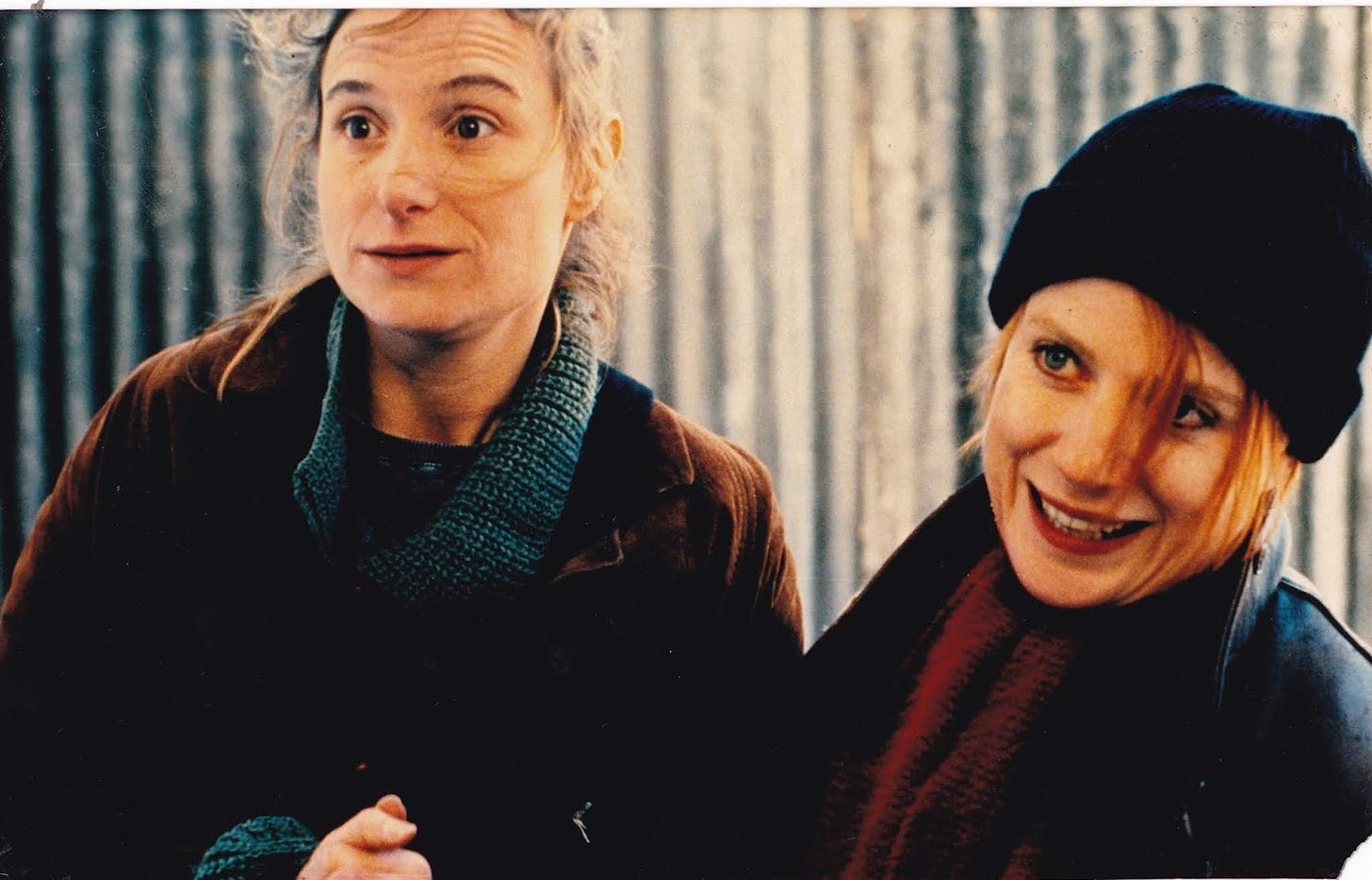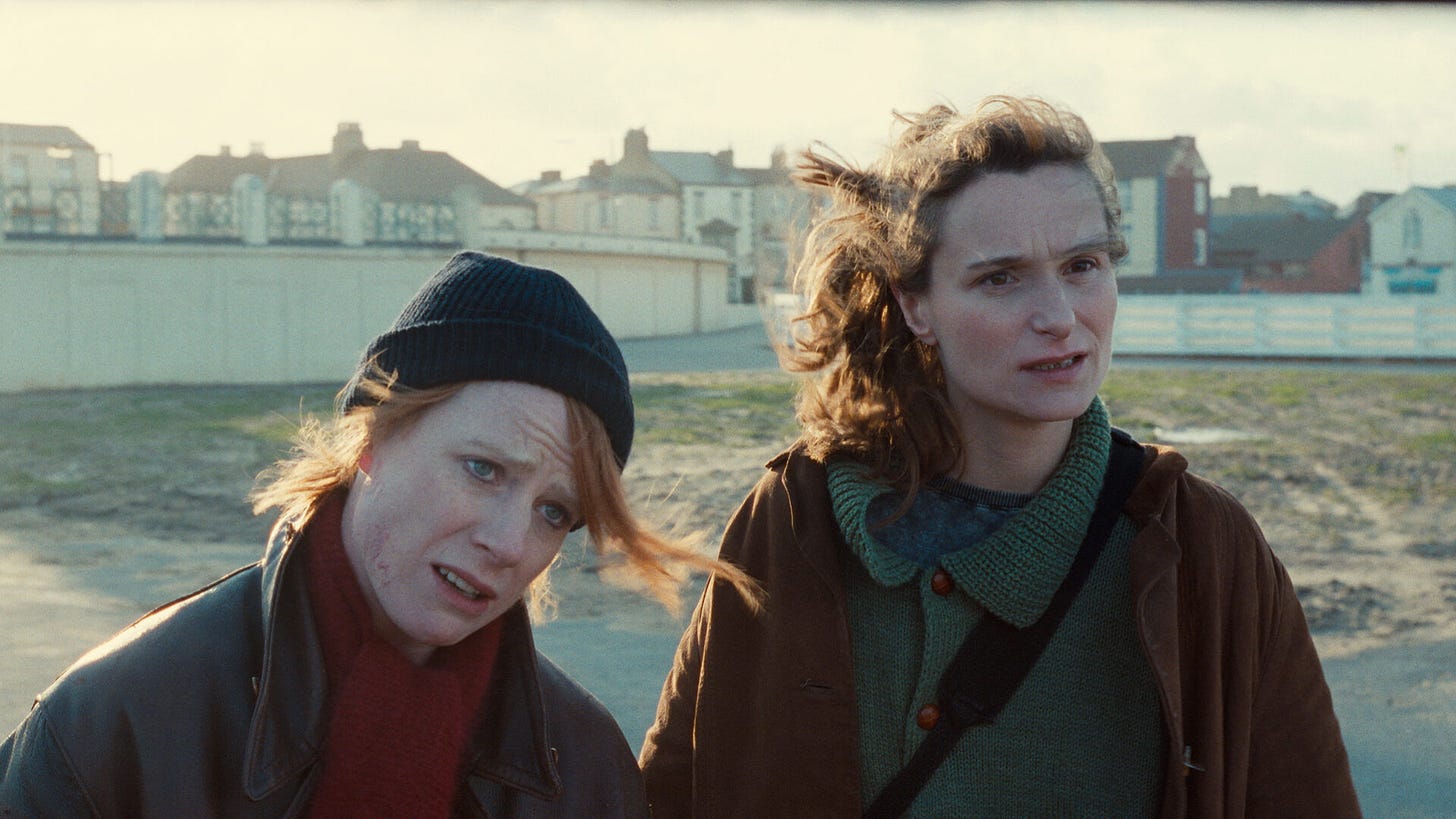The Soundtrack of Our Lives: Mike Leigh’s ‘Career Girls’
Leigh's 1997 film offers a bittersweet depiction of turning into an adult with a soundtrack of buoyant songs from The Cure.
In the opening moments of Mike Leigh’s 1997 film Career Girls, Annie (Lynda Steadman) makes her way to London in silence. Traveling south by train from her home in Wakefield, she flips through a magazine, accompanied only by the sound of the train clacking its way along the tracks. Annie’s getting away for the weekend, but she’s really on a journey through the past, one that starts to intrude on her thoughts and interrupt her outwardly placid journey even before she arrives. And Annie's past, the film soon reveals, was much noisier.
Career Girls jumps freely between Annie’s London visit and her time in the city as a student when, without a place to stay, she answers an ad for a room in a shared flat. Standing outside, Annie seems nervous. But, as the film will soon reveal, Annie always seems nervous. She has a habit of flipping back her dyed-orange hair, twitching her face, and widening her eyes in pained exasperation when she senses no one is looking. She talks fast and always at the high end of her vocal range. She’s a woman uncomfortable in her own skin, both figuratively and literally thanks to the dermatitis that covers one side of her face in flaky scales. As she waits for her could-be roommates to answer the door, she doesn’t know what to expect. She can’t yet know she’ll fit right in.
After being invited in by current tenants Claire (Kate Byers) and Hannah (Katrin Cartlidge) — the latter quick to clarify that her name is pronounced “ha-NAH” — Annie is subjected to a short interview that prompts her interrogators to exchange amused glances. But they’re not in the habit of passing judgment on the weirdness of others. English majors and self-styled nutters, Claire and Hannah speak in shared references and frequently play a game where they attempt to divine the future by randomly landing on passages from Wuthering Heights after making a plea to “Ms. Bronte.” After visiting her alcoholic mother, Hannah does nothing to hide her anger but otherwise speaks in a string of jokes. For her, irony is less a rhetorical device than a default mode of communication. The stereo blares The Cure at all hours. It’s Annie’s favorite band. She’s found a place to stay.
In the present, ten years on from the moment Annie answers the ad in 1986, it’s Hannah that Annie has come to visit. As they make hesitant small talk in Annie’s car on the way back from the train station, both start to sense they’ve changed. In some respects, they’re right. Six years out of college, both have abandoned late nights and punk-inspired fashion for nondescript jobs, steady paychecks, and a sensible wardrobe. Hannah, Annie discovers, lives in a pleasant, if small, apartment but has plans on buying a place of her own. Gone are the band posters that once covered every inch of her room (though a small stack of CDs rests next to the stereo). The tasteful vase Annie’s brought as a present matches the rest of the decor. But as the visit progresses, the divide between their past and present starts to thin, if only for a little while
.Even by Leigh’s standards, Career Girls remains modest in scale and unconcerned with zippy plotting (or much conspicuous plotting at all). It focuses instead on how friendships shift over time and the curious ways memories stick with some and not with others. At her apartment, Hannah serves Annie tea in cups that, years ago, spurred an argument when they were dividing up their possessions as their studies ended and they prepared to go their separate ways. For Annie, it’s a key moment in their relationship. For Hannah, it takes some prompting to remember where she got the cups in the first place.
In Leigh’s filmography, Career Girls tends to be overshadowed by some of its companions — it’s sandwiched between Secrets & Lies and Topsy-Turvy — but I don’t think I’ve ever seen a better film about the changes that occur between the last years of irresponsible youth and the moment you realize that there’s no turning back from adulthood. In the first scenes, set in the past, both Steadman and Cartlidge appear initially to be delivering overly mannered performances but what follows makes sense of their choices. Both are portraying kids playing at the kind of people they want to become. In college, they’re all sharp edges, rarely attempting to hide the anger and hurt roiling them. A decade on, life’s sanded those edges down.
It hasn’t eliminated them, however. When Annie joins Hannah’s present-day real estate hunt, their sparky, anarchic chemistry starts to rekindle. Their first stop gives them a chance to tease a loutish yuppie (Andy Serkis) attempting to unload a condo filled with nude drawings of his ex-girlfriend (and maybe lure them into bed in the process). Their second finds them untied in their mocking of a slick real estate agent named Adrian (Joe Tucker), until they recognize him as a man both dated in college, a situation that put considerable strain on Hannah and Annie’s relationship and left Annie with pain that hasn’t quite faded years later. He never recognizes them. Time’s funny that way
.As in all the flashbacks, Career Girls’ love triangle plays out partly in scenes soundtracked by the music of The Cure, drawn from the height of the band’s U.K. success when it sent eccentric pop hits like “The Lovecats” and “Let’s Go to Bed” up the charts. Leigh beautifully captures the way music can define whole phases of life, particularly those early phases when it seeps into the fabric of memory itself. These years of big emotions, of giddy highs and seemingly bottomless depths were the Cure years for Hannah and Annie.
Late in the film, when they return to the site of the flat they shared above a Chinese restaurant — shortly before unexpectedly encountering another old friend, Ricky (Mark Benton), who’s descended into apparently untreated mental illness since last they saw him — they find it abandoned and its side plastered in band posters, including one announcing “The 13th,” a new single from The Cure. “I haven’t listened to them for ages, have you?,” Hannah says to Annie as if remembering the band’s existence for the first time since college ended. “Yeah,” Annie replies, smiling and nodding, “Now and again, yeah.”
Hannah’s put the past behind her but it still has a hold on Annie and Career Girls offers no indication as to which attitude is healthier. Whether it's letting those years slip into the distance, never looking back, or keeping their memories close enough to sting, both options offer their own distinct flavors of bittersweetness.* The film ends as their reunion draws to a close and both promise to see each other again sooner than the last time. And maybe they will, but for now both return to the lives they now lead in different cities, lives once connected by music that keeps getting fainter as the comfort and safety of quietness tightens its grip.
* Watching the film now summons a different sort of bittersweetness. Steadman, so promising here, hasn’t appeared on screen in twenty years. Cartlidge, excellent here as she is in Leigh’s Naked, Before the Rain and elsewhere, died in 2001 at the age of 40.







On Halloween 1997 I was on a team that streamed a Cure show live from Irving Plaza, but this is one Mike Leigh film that was never on my radar. Sounds like I need to cure that.
What a sad addendum there on these two actresses. I need to see this one again -- I love how nearly all of Leigh's films feel like we're just hanging out with his characters. And I love it when films use offscreen time as a device to show us how characters change or don't ... and trust the audience to do the work of understanding the scope of these changes. A current release in the theaters (PAST LIVES ) also does this so evocatively.